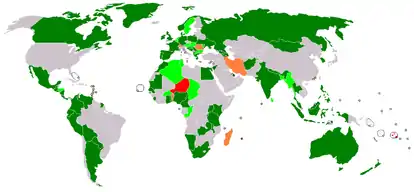Global Alliance of National Human Rights Institutions
The Global Alliance of National Human Rights Institutions (GANHRI), formerly known as the International Coordinating Committee of National Human Rights Institutions, sometimes shortened to the International Coordinating Committee (ICC), is a global network of national human rights institutions (NHRIs) – administrative bodies set up to promote, protect and monitor human rights in a given country. The GANHRI, whose full legal title is the "Global Alliance for National Human Rights Institutions", coordinates the relationship between NHRIs and the United Nations human rights system, and is unique as the only non-UN body whose internal accreditation system, based on compliance with the 1993 Paris Principles, grants access to UN committees. Institutions accredited by the Subcommittee for Accreditation (SCA) of the GANHRI with "A status", meaning full compliance with the Paris Principles, are usually accorded speaking rights and seating at human rights treaty bodies and other UN organs, mainly to the Human Rights Council. The GANHRI representative often presents statements on behalf of individual NHRIs or the regional groups.
The GANHRI is constituted as a non-profit entity under Swiss law, and has one member of staff representing it at the United Nations Office at Geneva. Secretariat support is provided to the GANHRI by the National Institutions and Regional Mechanisms (NIRM) Unit of the Field Operations and Technical Cooperation Division of the Office of the United Nations High Commissioner for Human Rights (OHCHR).[1] Additional work devolves on the NHRI elected to chair the network, currently chaired since 2016 by Dr. Beate Rudolf from the German Institute for Human Rights, and on the regional chairs of the GANHRI's four regional networks.
The GANHRI holds annual general meetings (usually in Geneva in March, coinciding with the UN Human Rights Council session) and a biennial thematic international conference; the tenth conference, hosted in 2010 by the Scottish Human Rights Commission, was on the theme of business and human rights.[2] The last International Conference to date was held in Merida (Mexico) in October 2015 and focused on the Sustainable Development Goals and on the topic of: "What Role for National Human Rights Institutions?"[3]
The peer review process for initial accreditation, and re-accreditation every five years, is managed by a subcommittee consisting of one representative of each of the regional networks. Magali Lafourcade is the current Sub committee on accreditation Chairperson. According to the last accreditation status document released in January 2017, there were a total of 117 institutions that have been accredited by the GANHRI. 74 of those NHRIs were accredited with "A status" by the GANHRI, and are thus entitled to vote or hold office in the GANHRI or its regional groups; those with lower status (33 B status, meaning not fully compliant with the Paris Principles, and 10 C status meaning not compliant) can only participate as observers.[4]
Regional groupings of NHRIs

- Network of African National Human Rights Institutions (NANHRI)
- Asia Pacific Forum of National Human Rights Institutions (APF)
- European Network of National Human Rights Institutions (ENNHRI)
- Network of National Institutions in the Americas
Working groups
References
- "NHRI Main". Ohchr.org. Retrieved 2016-11-18.
- "Archived copy". Archived from the original on 2011-03-15. Retrieved 2010-10-12.CS1 maint: archived copy as title (link)
- "12th International Conference". nhri.ohchr.org. Retrieved 2017-04-21.
- "CHART OF THE STATUS OF NATIONAL INSTITUTIONS (as of January 2017)" (PDF). Nhri.ohchr.org. Retrieved 2016-11-18.